- Home
- Diana Wynne Jones
Deep Secret Page 7
Deep Secret Read online
Page 7
“See?” I said to Stan. “Not sentimental at all.”
Then I set to work with a large globe of the world, pins and strands of cotton. It was important to find a point in this country to which it was best to summon my four candidates. Because this was fateline work, the place had to be a node of power (there are a surprising number of these nodes in the British Isles) and the distance between this place and each of the four people had to satisfy mathematical laws. It also had to be somewhere where any of them might naturally expect to go. Even though they would be tugged to this spot by a series of Magid-made accidents, I could not stretch the laws of probability too far for fear the three I did not select would notice.
This was why I ruled out all the solitary nodes like Stonehenge, or most castles, or that hidden valley in Derbyshire, and looked mainly at towns or at country places where there were conference centres. Before long, I was sitting in a heap of guidebooks and information leaflets, darting between these and the globe, and then to the detailed maps spread out on the floor. I needed a mundane, normal-seeming node. Stan was a great help here. As a jockey, he had rushed all over the country to racecourses in every corner of it, and he knew hotels and nodes I had never heard of.
Myself, I had hoped to bring everyone together in London, but that did not satisfy the numerical conditions. Annoyingly, it would have been fine had Mallory still been in the equation. I found I was interrupted here by a great rush of anger and exasperation at Mallory. How dared she lead me such a dance! How dared she go on doing so, even when I had eliminated her!
Stan recalled me by suggesting we considered some of the nodes in the Midlands. There are some good strong ones there. I wondered about Nottingham, but the numbers were off there too.
“Pity, that,” Stan said. “Nottingham’s a place where everyone goes sooner or later. All sorts of reasons. You want a lot of reasons. Concerts, conferences – or a racecourse would do it.”
“There are reasons for going to Birmingham,” I said, “but the node there’s only a pinprick. How about Stratford-upon-Avon?”
“Too many tourists,” he said. “Is Wigan any good?”
Wigan was numerically wrong. After hours of discussion and measuring and reading brochures, we settled on a medium-sized town called Wantchester. We both knew it. Stan said there were at least two good hotels there because of the racecourse. The guidebook claimed there were conference facilities and a factory that made small-arms. These were clearly new since Stan’s day, and mine. Stan remembered a pleasant, sleepy town. My memories were from a summer holiday there with my family, and I mostly remembered the river. There had been a fishing competition there for children. I had been in the grip of a fishing craze – I suppose I would be about nine at that time – and I had eagerly enrolled in the competition. I fished all day without the slightest luck. I was, I remember, disentangling my line from a willow tree for at least the fortieth time when my brother Will arrived and wanted to try his luck too. He never wanted to be outdone by his younger brothers.
The supervisor must have been very good-humoured. He gave Will instructions and Will borrowed my rod, and the supervisor left us to it. Will, in his usual way of always succeeding at everything, almost instantly hooked a fine fat fish. He struck at precisely the right moment and landed it perfectly. Then there was terrible trouble, because Will couldn’t bear to kill it and neither could I. It flopped about madly. We shouted for the supervisor, but he was out of hearing, and we were forced to deal with it ourselves. Between us, we succeeded in getting the hook out of its mouth and we threw it back in the river, where it floated on its side, convulsing and obviously dying. Will realised he had half-killed it. He burst into tears, even though he was thirteen. I felt awful. I kept trying to get the fish out of the river again and I couldn’t. We were in this state when our brother Simon wandered by. Simon hates killing things, so he had kept away from the fishing. When he saw us, Will in tears and me white and dithering, he simply waded into the water, fetched out the fish and whacked its head on a stone. “There,” he said, and went on his way. I gave up fishing after that. Will never tried again.
Later on, these memories of Wantchester struck me as decidedly inauspicious. Maybe they did even at the time. If so, I dismissed them, because I was tired of looking. Wantchester fitted our requirements. Stan and I both knew the town. That was sufficient.
“Wantchester it is, then,” we said.
The next step was, of course, to go to the place and check it out. “I wish you could come too,” I said to Stan.
“You don’t need me to help you look at a town,” he said, threatening huffiness. I was beginning to see that Stan got irritated whenever I went somewhere without him. I said no more.
The next day I drove up to Wantchester and found the place still very pleasant, despite a one-way system and the cold wind of late February. I even took a walk by the river for old times’ sake. There were willow trees, currently bare, and brown water swirling under the bridge, just as I remembered, but the river walk was curtailed since that far-off holiday by the new factory built on the riverside. So I walked back into the town, to the large hotel I had seen standing across the end of the main square. The hotel I remembered dimly, although we had stayed in a guest-house, but my chief memory was of the way the square was more like a very wide street, with a market in it. To my joy, the square (or street) was full of stalls that day too, and I stared at crockery, fruit and clothing, much as there had been when I was a nine-year-old, all the way to the hotel.
I was rather disconcerted to find it was called Hotel Babylon.
There is no such thing as coincidence, thought I, and pushed through the large glass doors. Inside it was large and hushed and a queer mixture of modern décor with traditional market-town habits. There seemed to be mirrors everywhere and the receptionist was foreign, but the place was filled with huntin’-and-fishin’ types who were here for the horse sales, and lunch was traditional and nourishing, served by staff with local accents. As I ate chicken and mushroom pie among the mirrors, I realised that the building was actually on the node. Better and better. After lunch, I enquired about booking a room for the Easter weekend. Stan and I had settled on Easter because that is a powerful time-node.
I could get no sense out of the foreign lady. I asked to see the manager. His name was Alfred Douglas, but that was not his fault. Easter weekend? he said. He was very sorry, but all the rooms were taken by a convention over Easter.
I nearly went away. Possibly I should have done. Things would certainly have turned out very differently if I had. I was within a whisker of deciding to try another town when it occurred to me to ask what kind of convention – expecting the reply to be Freemasons, Social Workers or some kind of Business Training.
A book-lovers’ convention, Mr Alfred Douglas told me. Science fiction and fantasy – or he believed the term might be speculative fiction. That kind of area, sir, anyway.
There is no such thing as coincidence! I thought, marvelling. Mervin Thurless wrote science fiction. According to my American contacts, Fisk had once taught a course about writing it. I didn’t know how Punt and Gabrelisovic felt about this genre, but there were half my candidates at least ready to fit in. Two of them could come here in the most natural manner possible.
“But that’s just what I was looking for!” I said.
Deeper enquiries elicited the fact that the convention guaranteed to fill the hotel for five days and did the booking for its members. But Mr Alfred Douglas was happy to let me have the name, address and telephone number of the organiser. He was called Rick Corrie. I phoned him from the hotel.
He was very pleasant. I liked at once the voice that answered, “PhantasmaCon hotel liaison here.” We had a very agreeable conversation, in the course of which I discovered that Corrie, like me, worked with computers from his home. Certainly I would join the convention, he said, and named a modest fee – that he apologised for: it seemed the sum had gone up after Christmas. He would, he said, se
nd me the details and the hotel booking-form, and urged me to get it back to him quickly because the hotel was already quite full.
I gave him my address. “What happens if I send my form back but you find the hotel is booked solid?” I asked.
“Oh, we try to fit everyone in,” he said cheerfully. “A lot of fans sleep on the floor – don’t tell Alfred Douglas that – but I’ve got the Station Hotel lined up to take the overflow if there is one. But you’ll want to be in the Babylon if you can. That’s where the action will be.”
I promised to get my application back to him by return of post and rang off. Then I did a small amount of adjusting before I left, to ensure that I and my four candidates would indeed have rooms here. And – perhaps it was the thought of a letter by return of post – I found myself once more interrupted by a surge of rage against Mallory. So, as an afterthought, I did some more adjusting, to make sure that Mallory could have nothing to do with this. Then I went home, rather pleased with my day’s work.
There followed a time of intense, detailed labour to wind the fatelines in exactly the right way. Almost the only communication I had with the outside worlds was when I received from Rick Corrie a bundle of highly peculiar stuff. Opening it, I wished that Fisk, Punt or Thurless had replied to me anything like so promptly (in fact, none of them ever replied: either my letters went astray or they did not strike any of the three as important) and was once again seized with irrational rage at Mallory. My fingers quivered with fury as I examined Corrie’s bundle.
Some of it was the booking-forms he had promised me. That concerning the hotel was normal enough – except that I was required to state whether or not I wanted mushrooms for breakfast – but the booking-form for the actual convention was full of curious passages. I read: ‘Fans wishing to enter the Masquerade should state in advance whether Animal, Human or Other. We’re having three classes this year’ and a little further on: ‘PhantasmaCook entries must be checked in on arrival. The hotel manager has asked that no actual construction of green slime etc. be done in the hotel bedrooms’ and right at the end: ‘We regret having to ban explosions, but after last year the cost of insurance is now too high.’
Wondering what happened last year, I turned to the thing labelled Progress Report III and stared at it. My face was probably a study. Stan demanded to know what was the matter.
“‘Hobbits will be mustering under Gandalf as usual in the Ops Room,’” I read out to him. “‘Esoterica with the Master Mage is in a dimension yet to be fixed… Filking will be in the Home Universe this year… Writers’ Circle is rounding nicely in the hands of Wendy the Willow but there are rumours of another. Watch this space… Bumpkin has agreed to handle Games and Games Workshop… No charges of fraud in the Tarot classes this year, please. Our new reader is a genuine sensitive… There are still a few places in the Dealers Room. Apply to Eisenstein… Security will be handled by HitlerEnterprises and all swords are to be in their charge until Sunday…” Stan, who are these people?”
“Ordinary folks having fun, I expect,” he said. “Nobody’s really normal when you come down to it. But I’ll tell you something – they can’t draw.” He was right. The brochure – if that’s what it was – was decorated with blurred portraits of wizards, witches and girls wearing little but jewellery. All were extremely badly drawn.
“Oh, well,” I said, and sent the man Corrie a cheque.
A week later he sent me a receipt and a certificate to say I was now an official member of PhantasmaCon, with a room booked in the Hotel Babylon to prove it.
Otherwise, as I said, I was hard at work, both in the house and in the shed at the end of the yard. The shed is one of the reasons I bought the house. It is big and airy and someone had already laid a smooth wooden floor in it. I have added heating. That floor means I can chalk symbols and figures at need. For fateline work, you need, among other things, a double spiral Eternity, which is the very devil to get drawn right. Shortly after Corrie’s certificate arrived, I was crawling on the floor in my barn, dressed in my oldest clothes, chalking and rubbing out and chalking again, when I looked up to see Andrew standing in the doorway.
He gave no sign that he thought I might be doing something out of the ordinary. He said, in his vague, deadpan way, “I was wondering when you might be ready to give me a lift.”
I had forgotten his car had broken down. I got up, dusted my knees, and devoted the rest of the day to sorting him out. I remember that some time while I was driving him – either to Cambridge or Huntingdon or back – I said airily, “I do a lot of programming on my knees. It helps to see it all spread out.”
He said, “I do a lot of my thinking walking over the fields.”
I assumed all was well, but I took the precaution, when I went back to work next day, of putting heavy prohibitions round the barn, and round the house, the yard and my strip of front garden too. Then, confident that I could not be disturbed again, I went back to chalking and crawling.
By the early evening, I was ready to walk the spiral. It takes immense concentration, because you are pulling four people’s fatelines with you – not to speak of your own – and you can do a great deal of harm, to those people and to the rest of the other world where their lines connect to everyone else’s, if you get it wrong. I was shuffling forwards along the chalklines, with my arms spread to keep the world in balance, when I looked up to see a figure straddling the loop at the far end. I couldn’t see the person clearly because he was silhouetted against the stream of orange sunlight slanting from the high window of the barn. Chalk dust and motes from the barn itself were catching the light too and standing round him like rays. He looked vast.
You know that feeling when your stomach seems to drop away, leaving you cold and empty. I felt that. But I couldn’t stop. That would have been really dangerous. My first thought was, At least it isn’t Mallory! I wouldn’t have put it past her. Then I thought it might be Stan, made visible by the dust. But the figure was too huge. I had to shuffle on for another five minutes, until I came to a place where the sunlight lit him sideways from my point of view. Then I could see it was Andrew. He was just standing there, staring. He seemed totally bemused, but I could see his eyes watching me.
“You shouldn’t be here,” I said to him, when I could spare the attention.
He smiled. It worried me, the way that smile made him look so intelligent. But he seemed to be in a sort of trance-state in spite of it. I could feel he was, when I got close to him. Since he was across my chalk marks, I had to take him by the elbows and move him aside. He moved just like a zombie and stood where I put him. I shuffled on past and round the spirals at the top of the loop, hoping for the best. But when I had rounded the curve at the top to face the other way, I found Andrew had moved again while my concentration was elsewhere and was now standing straddling the loop at the opposite end. From there, the sun shone yellow on his blank, austere face.
Damn! I thought, and shuffled on. I had to face the fact that Andrew had somehow got himself entangled in the fatelines I was manipulating. He had no idea of it, of course. He must have wanted to borrow some sugar or something, and arrived at just the wrong moment. When I had finished, I took him by one arm, led him across the yard in the gloaming, and let him out of the gate.
He came to himself as soon as he passed my prohibitions. “Thanks,” he said, as if he had now borrowed the sugar. “I’ll see you.” And he walked off beside the hedge to his own house.
“Look on the bright side,” Stan said when I told him. “It wasn’t Mallory.”
“God forbid!” I said. “But what do you think I’ve done to him?”
“Lord knows!” Stan said. “I’ve never heard of this happening before, but it may be just that Magids didn’t mention it. It can’t be too serious. I hope. Probably the worst that can happen is for our Andrew to take a whim to report to Gandalf as a hobbit.”
“I just hope that’s all,” I said.
From Maree Mallory’s
Thornlady
Directory, extracts
from various files
[1]
OK. So I’ve been behaving badly to Janine. As usual.
Janine was furious when I had to move in with them. She was so poisonous that I said to her, “You try living with your husband’s sister down the road! You try to write essays that are supposed to count towards your degree with seventeen children yelling round you!” My dad’s sister Irene has five kids of her own and two from her latest husband, but she finds life too quiet unless each of them has at least one little friend staying the night every night. Fortunately, the last thing my little fat dad did before they carted him off for chemotherapy – apart from giving me his car, that is – was to get on to his brother Ted and make Ted promise to house and feed me. So I told Janine to take her objections to Uncle Ted.
She said, “What’s wrong with university accommodation?”
“No room,” I said. “I was in a flat, but it was let over my head.”
That’s actually not quite what happened, but I wasn’t going to tell Janine. Robbie was sharing the two rooms with me (that I had used all my money paying for in advance) and then he just coolly moved his new bint Davina in instead of me. Or he said I could sleep on the sofa, I believe, though I may be wrong because I was too angry to listen at the time. I stormed off to Mum’s in London, swearing never to come back. And I meant it too, until Dad made me. He made me go back and I had to spend one glorious month in Aunt Irene’s house. And I told Dad, “Never again!” about that too, which is why he fixed things up with Uncle Ted.
Janine looked daggers at me. But she doesn’t go against Uncle Ted. If she did, he might notice the way she manages him. She’s going to bide her time and wait to work Uncle Ted round to thinking I’m impossible. So she did that thing she does, of pulling down the sleeves of her sweater so that her gold bangles jangle. Tug. Tug. Toss impeccable hair. Go away, clack, click, clack, to start phoning the unfortunate girls who mind the clothes shop she owns up in Clifton. She’s still sacking them for practically no reason. I heard her say to the phone as I went upstairs with another load of my stuff. “She’ll have to go. I’ve had quite enough of her.” She gets those awful sweaters she wears through that shop of hers. The one I hate most is the one she was wearing then, that looks as if she’d spilt rice-pudding over one shoulder. Nick says he hates the one with the bronze baked beans most.

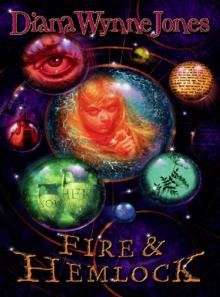 Fire and Hemlock
Fire and Hemlock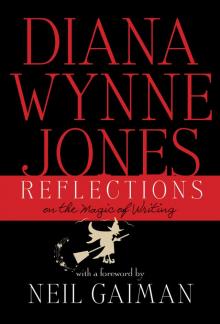 Reflections: On the Magic of Writing
Reflections: On the Magic of Writing The Game
The Game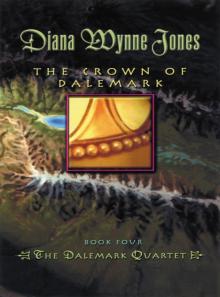 The Crown of Dalemark
The Crown of Dalemark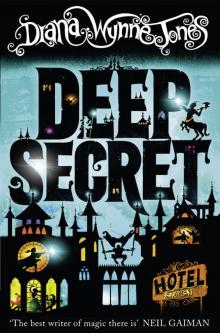 Deep Secret
Deep Secret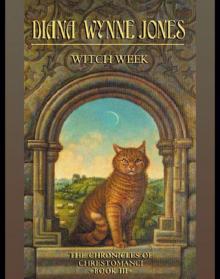 Witch Week
Witch Week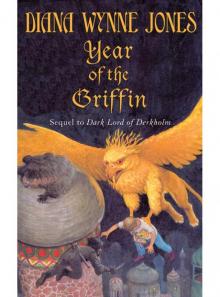 Year of the Griffin
Year of the Griffin Wild Robert
Wild Robert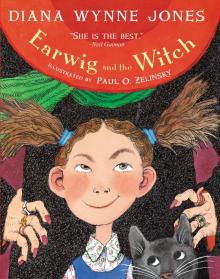 Earwig and the Witch
Earwig and the Witch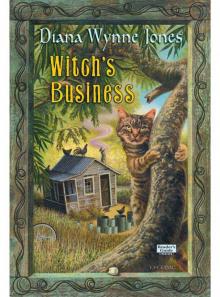 Witch's Business
Witch's Business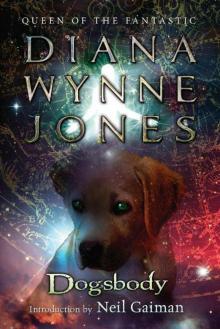 Dogsbody
Dogsbody Caribbean Cruising
Caribbean Cruising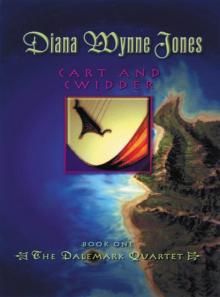 Cart and Cwidder
Cart and Cwidder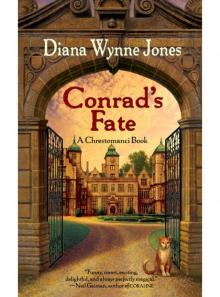 Conrad's Fate
Conrad's Fate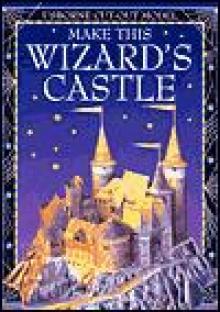 Howl's Moving Castle
Howl's Moving Castle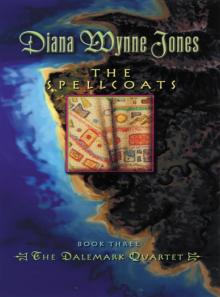 The Spellcoats
The Spellcoats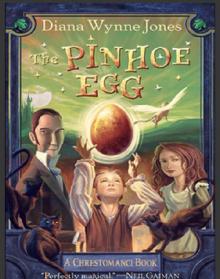 The Pinhoe Egg
The Pinhoe Egg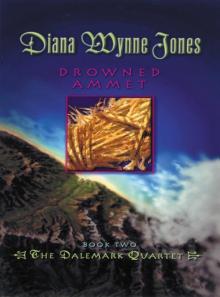 Drowned Ammet
Drowned Ammet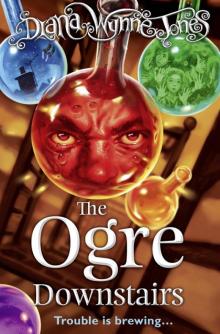 The Ogre Downstairs
The Ogre Downstairs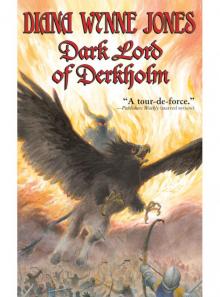 Dark Lord of Derkholm
Dark Lord of Derkholm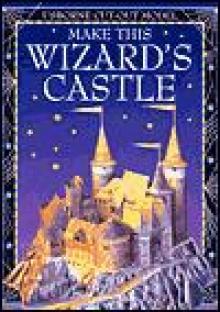 Castle in the Air
Castle in the Air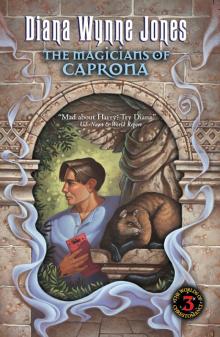 The Magicians of Caprona
The Magicians of Caprona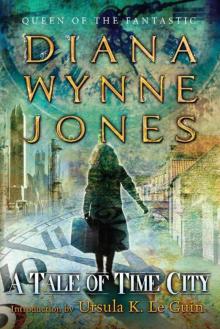 A Tale of Time City
A Tale of Time City The Lives of Christopher Chant
The Lives of Christopher Chant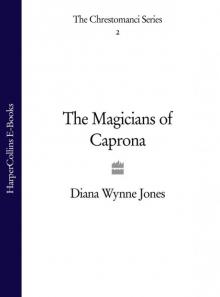 The Magicians of Caprona (UK)
The Magicians of Caprona (UK)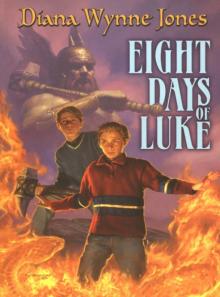 Eight Days of Luke
Eight Days of Luke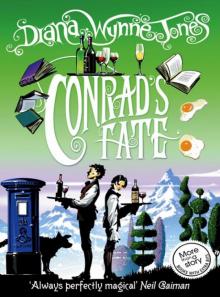 Conrad's Fate (UK)
Conrad's Fate (UK)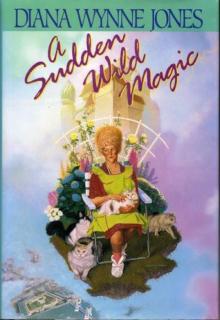 A Sudden Wild Magic
A Sudden Wild Magic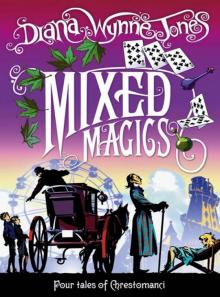 Mixed Magics (UK)
Mixed Magics (UK)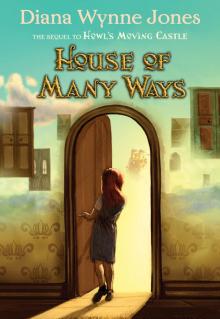 House of Many Ways
House of Many Ways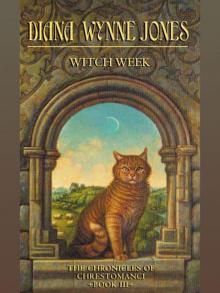 Witch Week (UK)
Witch Week (UK)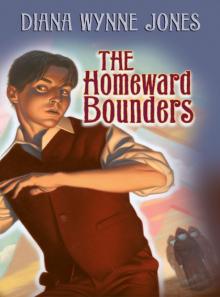 The Homeward Bounders
The Homeward Bounders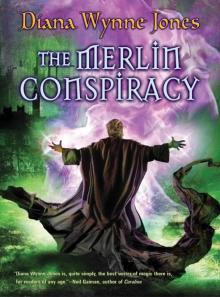 The Merlin Conspiracy
The Merlin Conspiracy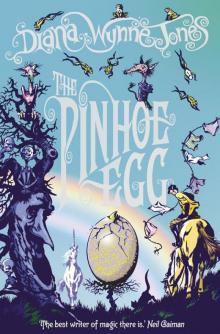 The Pinhoe Egg (UK)
The Pinhoe Egg (UK)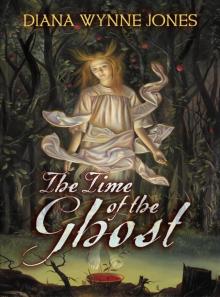 The Time of the Ghost
The Time of the Ghost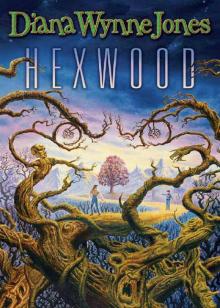 Hexwood
Hexwood Enchanted Glass
Enchanted Glass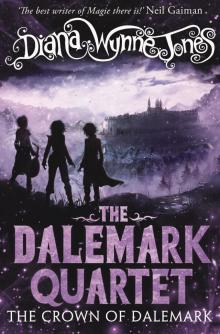 The Crown of Dalemark (UK)
The Crown of Dalemark (UK)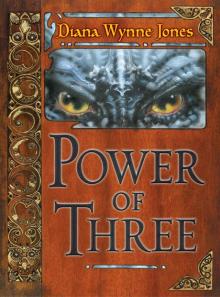 Power of Three
Power of Three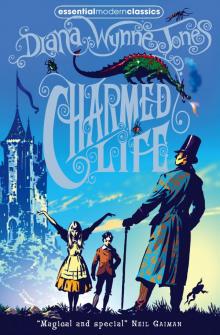 Charmed Life (UK)
Charmed Life (UK)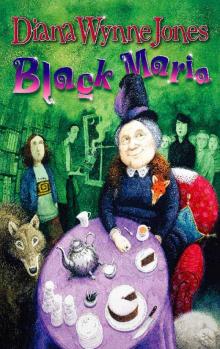 Black Maria
Black Maria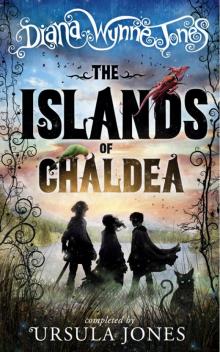 The Islands of Chaldea
The Islands of Chaldea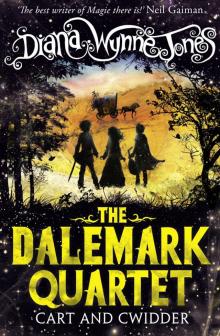 Cart and Cwidder (UK)
Cart and Cwidder (UK)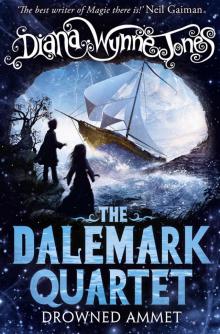 Drowned Ammet (UK)
Drowned Ammet (UK) Charmed Life
Charmed Life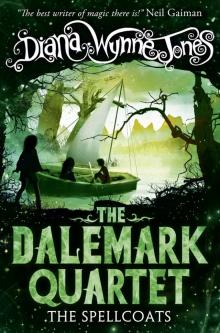 The Spellcoats (UK)
The Spellcoats (UK)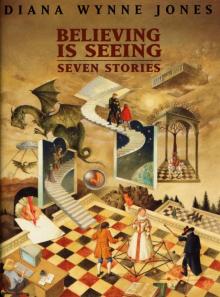 Believing Is Seeing
Believing Is Seeing Samantha's Diary
Samantha's Diary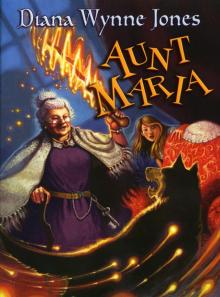 Aunt Maria
Aunt Maria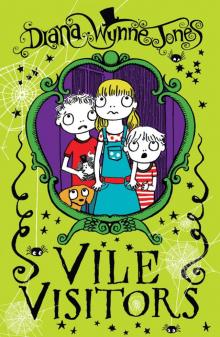 Vile Visitors
Vile Visitors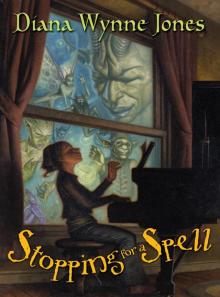 Stopping for a Spell
Stopping for a Spell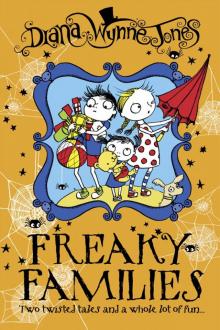 Freaky Families
Freaky Families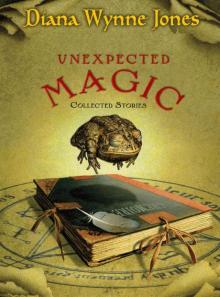 Unexpected Magic
Unexpected Magic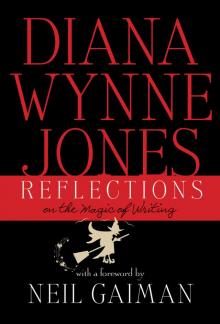 Reflections
Reflections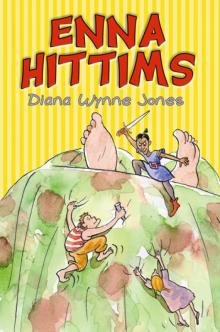 Enna Hittms
Enna Hittms Mixed Magics: Four Tales of Chrestomanci
Mixed Magics: Four Tales of Chrestomanci